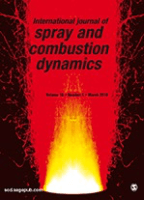
International Journal of Spray and Combustion Dynamics
Scope & Guideline
Transforming Energy Dynamics through Cutting-edge Research
Introduction
Aims and Scopes
- Combustion Dynamics and Instabilities:
The journal emphasizes the study of combustion dynamics, particularly the instabilities that arise in various combustion systems. This includes investigations into thermoacoustic instabilities, flame transfer functions, and the effects of flow oscillations on flame stability. - Spray and Atomization Technologies:
Research on spray dynamics, including atomization techniques and the behavior of liquid fuels in combustion systems, is a core focus. This includes studies on droplet dynamics, evaporation rates, and the impact of spray characteristics on combustion efficiency. - Numerical Modeling and Simulation Techniques:
The journal promotes the use of advanced numerical methods, such as computational fluid dynamics (CFD), direct numerical simulations (DNS), and reduced-order modeling to analyze combustion processes. This includes the application of these methods to predict and optimize combustion performance. - Experimental Investigations in Combustion:
Experiments play a crucial role in the journal's scope, with studies that validate theoretical models and simulations. This includes high-speed imaging and other diagnostic techniques to capture combustion phenomena. - Innovative Combustion Systems and Fuels:
The journal explores the development and analysis of novel combustion systems and alternative fuels, focusing on their performance characteristics and environmental impact.
Trending and Emerging
- Thermoacoustic Instabilities and Control:
There is an increasing focus on understanding and controlling thermoacoustic instabilities, which are critical for improving the performance and safety of combustion systems, particularly in aerospace applications. - Advanced Spray Characterization Techniques:
The journal is increasingly publishing research that utilizes cutting-edge imaging and diagnostic techniques to characterize spray dynamics, highlighting the importance of understanding atomization processes in modern combustion systems. - Integration of Machine Learning and AI in Combustion:
Emerging research involving machine learning and artificial intelligence for predicting combustion behaviors and optimizing combustion systems is gaining traction, showcasing the journal's adaptation to technological advancements. - Sustainable and Alternative Fuels:
There is a growing emphasis on the study of alternative fuels and their combustion characteristics, reflecting an industry-wide push towards sustainability and reduced emissions in combustion technologies. - Hybrid Modeling Approaches:
The trend towards hybrid modeling that combines computational fluid dynamics with low-order models or machine learning techniques is becoming more prevalent, indicating a shift towards more efficient and accurate predictive tools in combustion research.
Declining or Waning
- Traditional Combustion Theory:
Research centered on traditional combustion theories and models has become less prominent, as the field shifts towards more complex and dynamic systems that require advanced computational and experimental approaches. - Low-Temperature Combustion Studies:
Studies specifically focused on low-temperature combustion phenomena have declined, possibly due to a growing emphasis on high-temperature and high-pressure combustion scenarios that are more relevant to aerospace and industrial applications. - Basic Fuel Characterization:
While fuel characterization remains important, there has been a noticeable decrease in studies solely focused on basic physical and chemical properties of fuels, as the journal trends towards more integrated studies involving combustion dynamics and performance.
Similar Journals
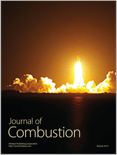
Journal of Combustion
Advancing Knowledge in Combustion TechnologyJournal of Combustion is a premier academic journal dedicated to the field of combustion science and technology, published by HINDAWI LTD. With an ISSN of 2090-1968 and an E-ISSN of 2090-1976, the journal has been an open-access platform since 2008, ensuring that cutting-edge research is accessible to all. Based in the United States at Adam House, 3rd Flr, 1 Fitzroy Sq, London W1T 5HF, England, the journal publishes articles spanning various relevant disciplines, contributing to knowledge in Chemical Engineering, Fuel Technology, and Energy Engineering. As of 2023, it ranks in the Q3 quartile in Chemical Engineering (miscellaneous) and Fuel Technology, and in Q4 in Condensed Matter Physics and Energy Engineering and Power Technology, highlighting its growing impact and relevance in these fields. Researchers will find valuable insights as the journal converges its findings from 2010 to 2024. With a focus on promoting innovative approaches and exploring new frontiers in combustion research, the Journal of Combustion continues to be an essential resource for academics, professionals, and students committed to advancing the understanding and application of combustion processes.

Propulsion and Power Research
Connecting Researchers to Propel the Industry Forward.Propulsion and Power Research, published by KEAI PUBLISHING LTD, is a leading Open Access journal that has been advancing the field of propulsion and power systems since its inception in 2012. With its commitment to fostering scientific discourse and innovation, the journal has gained a prominent position within academia, achieving a Q1 ranking in multiple categories such as Aerospace Engineering, Automotive Engineering, and Fluid Flow and Transfer Processes as of 2023. With an impressive ranking of #18 out of 153 in Aerospace Engineering and consistent recognition in the Scopus rankings, the journal explores critical advancements and research findings that propel the industry forward. As an Open Access publication, it ensures that groundbreaking research is readily available to a broad audience, enhancing collaboration between researchers, practitioners, and students. The journal's scope encompasses a wide range of topics within propulsion and energy solutions, making it an essential resource for anyone keen on discovering significant developments in this dynamic field.
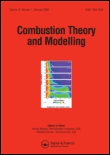
COMBUSTION THEORY AND MODELLING
Igniting Innovation in Energy TechnologyCombustion Theory and Modelling is a pivotal journal for researchers and professionals in the fields of chemical engineering, energy technology, and combustion science. Published by Taylor & Francis Ltd, this journal, with an ISSN of 1364-7830 and E-ISSN 1741-3559, provides a platform for disseminating significant advances in our understanding of combustion processes and their applications. With a solid impact factor, as reflected in its Q2 ranking across multiple categories including Chemical Engineering, Energy Engineering, and Modeling and Simulation, it serves not only to enhance theoretical knowledge but also to bridge the gap between theory and practical applications. The journal spans a wide timeline from 1997 to 2024, ensuring that it covers both foundational studies and cutting-edge research. Situated in the UK, the journal actively invites submissions that contribute to the evolving landscape of combustion science, making it an essential resource for academics, industry professionals, and students keen on exploring the dynamics of energy and fuel technologies.
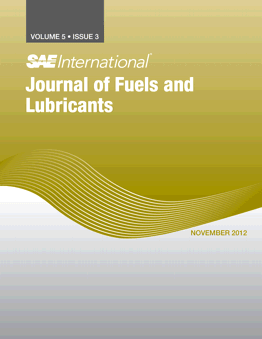
SAE International Journal of Fuels and Lubricants
Connecting Academia with Industry for Impactful ChangeWelcome to the SAE International Journal of Fuels and Lubricants, a leading peer-reviewed publication dedicated to advancing knowledge in the crucial fields of fuel technology and lubrication science. Published by SAE International, this journal serves as a vital resource for researchers, industry professionals, and students engaged in the study and application of innovative fuels and lubricants. With an impact factor indicative of its importance, the journal is ranked in the Q3 category for both Fuel Technology and Pollution, highlighting its critical role in addressing global energy and environmental challenges. Covering a range of topics from fundamental research to practical applications, the journal not only contributes to academic discourse but also serves to inform industry practices. Our publication spans the converged years from 2009 to 2024, reflecting a commitment to continuous scholarly contribution. While currently operating under a traditional access model, the journal aims to foster an inclusive environment for discourse in the rapidly evolving fields of energy and environmental science.
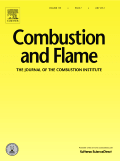
Combustion and Flame
Unraveling the Science Behind CombustionCombustion and Flame is a premier academic journal published by Elsevier Science Inc, dedicated to advancing the field of combustion science. Since its inception in 1957, this journal has consistently provided a platform for rigorous research and groundbreaking discoveries in the realms of Chemical Engineering, Chemistry, and Energy Engineering, illustrating a significant Q1 ranking across multiple categories, including Fuel Technology and Physics. With an impressive Scopus ranking, comprising the top 10% in fields such as General Physics and Astronomy, and General Chemical Engineering, Combustion and Flame serves as a critical resource for researchers, professionals, and students aiming to explore the complexities of combustion phenomena and their applications. Although it does not offer open access, the journal is known for its comprehensive articles and innovative research papers, fostering scholarly dialogue and the development of emerging technologies. The journal aims to connect researchers globally, ensuring that important findings are shared and disseminated effectively.

Thermophysics and Aeromechanics
Exploring the Dynamics of Heat and MotionThermophysics and Aeromechanics, published by PLEIADES PUBLISHING INC, is an esteemed journal dedicated to advancing the fields of aerospace engineering, energy engineering, modeling and simulation, as well as nuclear and high energy physics. With an ISSN of 0869-8643 and E-ISSN 1531-8699, this journal serves as a vital platform for researchers and professionals working at the intersection of thermophysics and aeromechanics, delivering cutting-edge research, reviews, and case studies. Despite its current position in Quartile Q4 across multiple categories, including aerospace and energy engineering, it provides a unique opportunity for emerging ideas in these domains to gain visibility and impact. The journal's convergence of diverse scientific disciplines is critical for fostering innovation and technological advancements, making it an essential resource for students, practitioners, and academics alike. In this era of rapid scientific development, Thermophysics and Aeromechanics plays a pivotal role in disseminating knowledge and facilitating interdisciplinary collaboration among a global audience.

International Journal of Energetic Materials and Chemical Propulsion
Connecting Researchers to Propel the Science of Energetic Materials.The International Journal of Energetic Materials and Chemical Propulsion, launched in 2009 by BEGELL HOUSE INC, serves as a pivotal platform in the interdisciplinary field of energetic materials and propulsion technologies. With an ISSN of 2150-766X and an E-ISSN of 2150-7678, this journal engages a diverse audience of researchers, professionals, and students interested in the advancements of materials science, particularly in relation to energetic materials. Despite its designation in the Q4 category for Materials Science in the 2023 ranking, the journal’s commitment to disseminating innovative research positions it as an essential resource for those exploring the potential and applications of chemical propulsion systems. Researchers can look forward to publishing and accessing a variety of studies aimed at improving safety and performance in this critical area of research. Although no Open Access options are currently available, the journal maintains a high standard of peer-reviewed content to ensure the integrity and relevance of its contributions to the field.
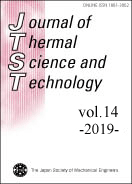
Journal of Thermal Science and Technology
Transforming challenges into solutions in thermal science and technology.Journal of Thermal Science and Technology, published by the Japan Society of Mechanical Engineers, is a distinguished open-access journal that has been serving the academic community since its inception in 2009. With a commitment to disseminating cutting-edge research in the realms of thermal science and its engineering applications, the journal has established itself as an essential resource for researchers, professionals, and students alike. Holding important quartile rankings in 2023, including Q3 in Atomic and Molecular Physics, Engineering (miscellaneous), and Materials Science (miscellaneous), this journal showcases high-impact studies that contribute to the advancement of technology and materials engineering. Open access since 2021, it aims to enhance the visibility and accessibility of critical research findings, thus fostering innovation and collaboration within the global scientific community. The journal’s dedicated editorial board actively seeks to publish novel insights that not only engage with existing challenges but also inspire future developments in thermal science and technology.

ATOMIZATION AND SPRAYS
Transforming Knowledge into Practical SolutionsATOMIZATION AND SPRAYS, published by BEGELL HOUSE INC, stands at the forefront of research in the dynamic field of chemical engineering, particularly focusing on the intricate processes of atomization and the mechanics of droplet dynamics. Established in 1996, this prestigious journal aims to disseminate innovative findings and methodologies that drive advancements in applications ranging from spray technologies in industrial processes to environmental technology and energy conversion systems. With a current Impact Factor that reflects its significance within the community—ranked in the Q3 quartile—it serves as a comprehensive resource for researchers, professionals, and students eager to deepen their understanding of fluid mechanics and spray applications. Though not an open-access publication, it provides critical insights and a platform for scholarly communication and exchange in its converged years, fostering collaboration and innovation within the domain.
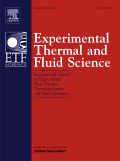
EXPERIMENTAL THERMAL AND FLUID SCIENCE
Transforming experimental insights into engineering excellence.EXPERIMENTAL THERMAL AND FLUID SCIENCE is a prestigious academic journal published by Elsevier Science Inc, dedicated to advancing the fields of thermal and fluid sciences. With a strong focus on innovative experimental research, it plays a crucial role in disseminating new knowledge and techniques across multiple domains, including Aerospace Engineering, Chemical Engineering, Fluid Flow and Transfer Processes, Mechanical Engineering, and Nuclear Engineering. Holding a notable impact factor and ranking in the Q1 quartile across these categories since 2023, the journal is recognized for its high-quality contributions, which appeal to a diverse audience of researchers, industry professionals, and students alike. Additionally, with dedicated coverage from its inception in 1988 to projections extending through 2025, EXPERIMENTAL THERMAL AND FLUID SCIENCE provides a vital platform for sharing advancements in experimental techniques and findings that shape the future of engineering and applied sciences.